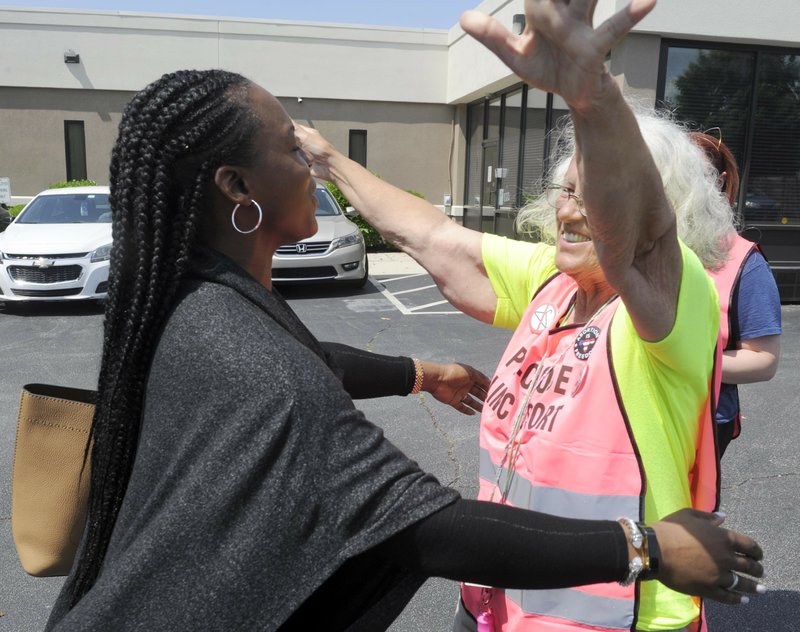MONTGOMERY, Ala. -- A federal lawsuit filed Friday asks a judge to block an Alabama law that outlaws almost all abortions.
The American Civil Liberties Union and Planned Parenthood filed the lawsuit on behalf of abortion providers seeking to overturn the Alabama law that would make performing an abortion at any stage of pregnancy a felony punishable by up to 99 years or life in prison for the abortion provider. The only exception would be when the woman's health is at serious risk.
The law -- the most far-reaching attempt by a conservative state to seek new restrictions on abortion -- is set to take effect in November unless blocked by a judge.
"Make no mistake: Abortion remains -- and will remain -- safe and legal in Alabama. With this lawsuit, we are seeking a court order to make sure this law never takes effect," said Randall Marshall, executive director of the ACLU of Alabama.
The lawsuit says the Alabama law to criminalize abortion is clearly unconstitutional and would harm women by forcing them to continue pregnancies against their will.
"For over 46 years -- since the Supreme Court decided Roe v. Wade -- U.S. law has recognized the fundamental constitutional right to make the profoundly important and personal decision whether or not to terminate a pregnancy," the lawsuit reads.
The plaintiffs in the case are the three Alabama clinics that perform abortions, Planned Parenthood and Dr. Yashica Robinson, an obstetrician who also provides abortions at the Alabama Women's Center in Huntsville.
Robinson said last week that the Alabama law has confused and scared patients, with some wrongly thinking abortion was already illegal.
She said the law "further shames" women seeking abortions and "punishes providers like myself, and stigmatizes essential health care."
Emboldened by new conservatives on the U.S. Supreme Court, Alabama is part of a wave of conservative states seeking to mount new legal challenges to Roe v. Wade, the 1973 landmark Supreme Court decision that legalized abortion nationwide.
Governors in Kentucky, Mississippi, Ohio and Georgia have approved bans on abortion once a fetal heartbeat is detected, which can happen as early as the sixth week of pregnancy.
In Missouri, Gov. Mike Parson on Friday signed a bill that bans abortions on or beyond the eighth week of pregnancy without exceptions for cases of rape or incest.
Under the law that comes into force Aug. 28, doctors who violate the eight-week cutoff could face five to 15 years in prison. Women who terminate their pregnancies cannot be prosecuted. A legal challenge is expected, although it's unclear when that might occur.
The measure includes exceptions for medical emergencies, such as when there is a risk of death or permanent physical injuries to "a major bodily function of the pregnant woman." But the lack of exceptions for women who become pregnant after being raped or subjected to incest has drawn sharp criticism, including from wealthy GOP donor David Humphreys, a Missouri businessman, who had urged the Republican governor to veto the bill and called it "bad public policy."
Parson defended the lack of exceptions as he spoke to a group of abortion opponents gathered Friday for the bill signing in his Capitol office.
"Is it a terrible thing that happens in those situations? Yes it is. ... But the reality of it is bad things do happen sometimes. But you have two months to decide what you're going to do with that issue, and I believe in two months you can make a decision," he said.
Also Friday, a federal judge temporarily blocked a Mississippi law that would ban most abortions once a fetal heartbeat is detected.
U.S. District Judge Carlton Reeves issued an order to stop the law from taking effect July 1.
He heard arguments Tuesday from attorneys for the state's only abortion clinic, who said the law would effectively eliminate all abortions in the state because cardiac activity is often first detectable around six weeks, when many women may not know they are pregnant.
Information for this article was contributed by Summer Ballentine and Emily Wagster Pettus of The Associated Press.
A Section on 05/25/2019

